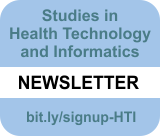 loading subjects...
loading subjects...

The issues presented at the workshop and this book are critical because telematics technology is now being used throughout the health care system for dealing with very sensitive data. More and more computers and systems are interconnected, they operate around the clock, they are increasingly interoperable, data are portable, and yet the primary demands are that they are correct, not corrupted, relevant, complete, and accessible only to authorised persons; data and systems must be secure. This raises technological and legal, regulatory, and ethical issues that are dealt within a national context, but also at the Community level in the form of proposals for EU directives on data protection and concerning the protection of personal data and privacy in the context of digital telecommunications networks. However, in most instances, the regulations are of a general nature and not specifically directed at health care.
During the AIM programme within the 3rd Framework workplan, the SEISMED project has been totally devoted to the subject of today, whereas a number of other projects, (NUCLEUS, TANIT, TRILOGY; SAPIENS from ENS, THIS from INFOSEC) also present at the meeting, have incorporated security and legal aspects into their work to get close to a real life situation. At the same time, the proper authorities have dealt with the policy issues and a neighbour programme, INFOSEC, has taken a lead in the necessary developments. I am glad most categories were present at the workshop and represented in this book. Naturally the on-going projects need to share experiences and debate the lessons learnt. It is even more important, though, that out of this meeting, and the project work, guidance will emerge for proposers to the next programme and criteria for those who shall select projects among the proposals. Basically we need to have a handbook to guide all those involved in their various capacities in developing and using telematics systems in healthcare. I very much hope that you will contribute to its creation. The TELEMATICS programme for the next 4 years has already been initiated. It will be user driven with an emphasis on the integration and the validation of systems and services in real user environments. Projects for the future need your work today. Add to that, the EU Council of Ministers meeting in Corfu, 1994, took a very positive stand on the creation of the European Information Society as described by the high level group under the leadership of Commissioner Bangemann. The group supported and elaborated on the Commission’s previous White Paper on European competitiveness, economic growth and employment suggesting a common physical infrastructures (Transeuropean Networks), common generic services and implementation of a number of applications including health care, but also speeding up the legal harmonisation process and assure legal security in a Union-wide approach.
Thus, with regard to work in Member States, in the Community, in local projects and in the coming European programme on TELEMATICS, we are right on time and contributing to the development of our joint future.



